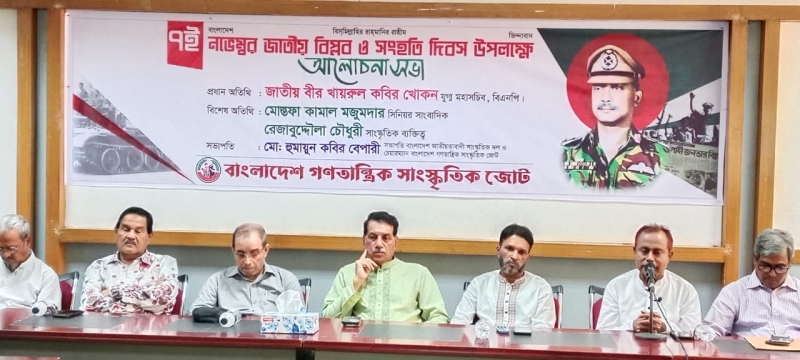- FAO Warns of ‘Silent Crisis’ as Land Loss Threatens Billions |
- Indices tumble on both bourses amid broad-based sell-off |
- BNP Names 237 Possible Candidates for Polls |
- Bangladeshi leader of disabled people of world Dulal honoured |
- UN Report Warns Inequality Fuels Global Pandemic Vulnerability |
Zia eulogised for rebuilding Bangladesh after 7 Nov revolution

Shamsul Labor Julian, joint secretary general of BNP was the chief guest at a discussion meeting on 7 November Revolution and Solidarity day on Tuesday.
Speakers at a discussion meeting on 7 November Revolution and Solidarity Day on Tuesday said that the historic 7 November Sepoy-people's Revolution of 1975 paved the way for consolidation of Bangladesh's independence and sovereignty.
The discussion meeting was organised by the Bangladesh Ganatantrik Sangskritik Jote at the Tafazzal Hossain Manik Mia Hall of National Press Hall. Khairul Kabir Khokan, former MP and joint secretary general of BNP was thr chief guest at the function which was also addressed by GreenWatch Dhaka editor Mostafa Kamal Majumder, cultural personality Rezabuddaulash Chowdhury, writer Kalam Fayezi and Asaduzzaman Babul with the jote chairman Humayun Kabir Bepari in the chair.
BNP owes its birth to the National Revolution and Solidarity Day. But neither BNP's founder Gen Zia nor any of its frontline leaders were directly involved in it. The revolution reasserted the will of the people to remain free, have freedom of opinion and expression and uphold independence and sovereingty.
Sepoys and people brought Zia to the centre of power and the responsibility to build Bangladesh fell on the most competent, trusted and patriotic man in Bangladesh who in no time took steps to organise the people and strengthen the elements to safeguard independence and sovereignty.
General Zia introduced the fundamental elements of what now constitute our nationhood - Bangladeshi nationalism, multiparty democracy and bismillah in the Constitution. A great patriot Zia in his short tenure at the helm introduced agricultural revolution, canal and river digging, plus mass revolution. He reeorganised the once neglected armed forces and took the initiative to form the South Asian Association for Regional Cooperate (SAARC).
Khairul Kabir Khokan said after being brought to power Ziaur Rahman united a fragmented nation by introducing Bangladeshi nationalism.
He was the forerunner of green revolution and laid the foiundatiins of the Bangladesh economy by introducing manpower export and promoting thenreadymade garment industry.
Zia who declared the independence of Bangladesh became so much popular through his nation building activities that the entire nation was deeply shocked when he was assassinated by some misguided army officers on 30 May 1981. His Namaj-e-Janaza was attended by several million mourners at the Manik Mia Avenue, the largest Janaza of any Muslim in history.
He said that Zia's successor Begum Khaleda Zia consolidated multi-party democracy and put the economy on solid foundations. Acting chairman of BNP reorginised the BNP into a strong party organisation as against sustained assaults by the fascists to destroy it.
Rezabuddaulah Chodhury said BNP's founder Ziaur Rahman wanted the younger generation to take the leadership of Bangladesh and tap its potentials to build a self-reliant country.

